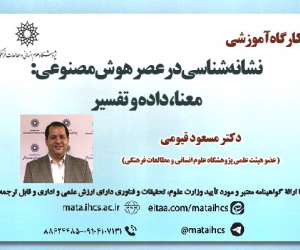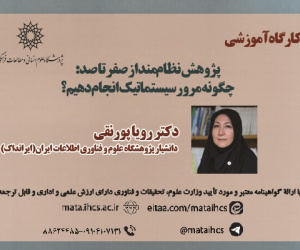مطالعه موردی انطباق ترانه های قدیمی با ممیزی های فعلی کلامِ آثار موسیقایی در حقوق ایران
آرشیو
چکیده
حقوق اداری ایران برای مواجهه با محصولات فرهنگی و هنری، همواره بر پایه نظام صدور مجوز بوده است. لذا اساساً محصولات فرهنگی و هنری تولید شده بدون مجوز رسمی از وزارت فرهنگ و ارشاد اسلامی و زیرمجموعه های آن را نه تنها به رسمیت نمی شناسد، بلکه آن را جرم هم تلقی می کند. تولید آثار موسیقایی باکلام هم از این قاعده، مستثنی نیست. با این تبصره که برای بررسی و مجوزدهی ترانه های آثار، قانون خاصی وجود ندارد و مقرره ای محل تامل به تاریخ 3/6/1400 مصوب وزیر فرهنگ و ارشاد اسلامی، ملاک است. اما سلیقه هیأت تصمیم گیر نیز، نقش پررنگی در فرایند صدور مجوز دارد. این پژوهش ضمن استخراج و گروه بندی ملاک های ممیزی کلام در آثار موسیقایی از میان رویه های موجود در کنار آیین نامه یادشده، به تطبیق و تحلیل کارهای اجرا شده توسط یکی از خواننده های موسیقی پاپ ایرانی در دهه 1350 تا قبل از پیروزی انقلاب اسلامی پرداخته تا مشخص شود چه میزان از این آثار با معیارهای امروزین ممیزی جهت دریافت مجوز، تطابق دارد. در این مقاله، 47 اثر خواننده که در سال های 1350 تا 1357 اجرا شده اند، با نگاه سنجه های ممیزی وزارت فرهنگ و رویکردی سخت گیرانه، مورد بررسی قرار گرفت و مشخص شد نیمی از ترانه ها اساساً هیچ مشکلی با توجه به معیارهای امروز ممیزی نداشته و قابلیت اخذ مجوز دارند. بنابراین اگر پای عوامل فراحقوقی در میان نباشد و صرف آثار و کلام، مطمح نظر باشد، در بسیاری از موارد، منعی برای دریافت مجوز ندارد و برای بعضی آثار هم با اعمال اصلاحاتی مختصر، می توان مجوز گرفت.Case study of Adaptation of Old Songs with Current Censorship of text in Administrative Law of Iran
Policy of Islamic Republic of Iran for facing with cultural and artistic products are based on controlling system of license issue and Iranian law basically not only does not recognize cultural and artistic products that are produced without license of Ministry of Culture and Islamic Guidance and its associated departments, but also it is regarded as crime. Producing music with text is not excluded from this rule but for licensing text of music, there is no complied policy and person interest of decision board plays key role. In this research, the criterion for censorship of text of music among available scattered references is extracted and grouped and then we compare and analyze executed works by Iranian pop music in 1970's and before victory of Islamic Revolution. The goal of this article is examining level of adaptation of these works with current censorship criterions for receiving license. In this article 47 works of singers during the year 1971 to 1978 by serious viewpoint of censors of Ministry of Culture and Islamic Guidance were examined and it was determined that half of the songs did not have any problem in compliance with current censorship principles of Ministry of Culture and Islamic Guidance and are able to receive license. Thus, if beyond legal factors are not involved and only according to presented musical tracks offered by these singers, it is not any prohibition for receiving license and through applying short amendments, it is possible to receive license.







